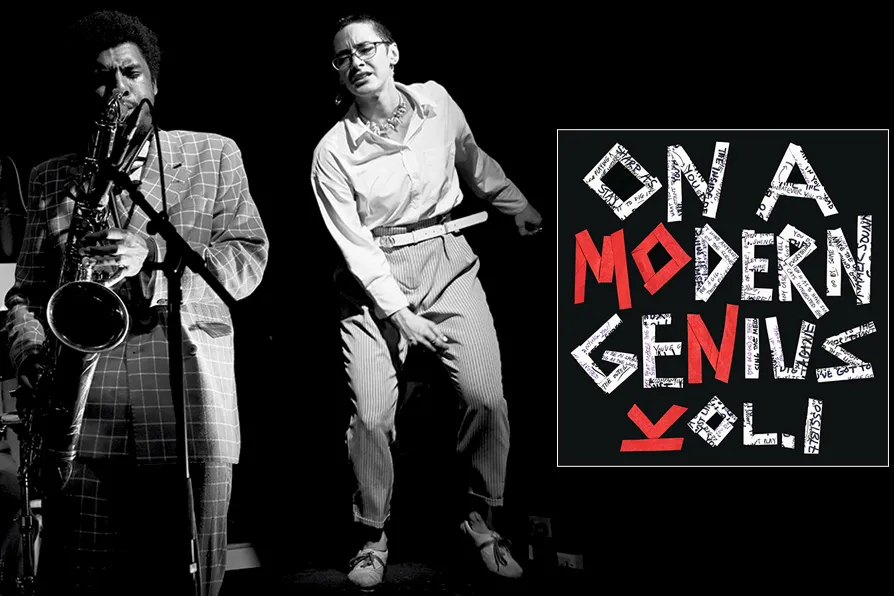GORDON PARSONS applauds a marvellous story of human ingenuity and youthful determination, well served by a large and talented company
Chris Searle speaks to saxophonist XHOSA COLE and US tap-dancer LIBERTY STYLES

 Xhosa Cole and Liberty Styles / Pic: Brian Homer
Xhosa Cole and Liberty Styles / Pic: Brian Homer
https://www.youtube.com/watch?v=LWOOWWlTUeQ
THELONIUS MONK (1917-82) in Birmingham, England: that’s the arrival of the brilliantly original interpretation of the master’s music, On a Modern Genius: Vol 1.
The instigator is local saxophonist Xhosa Cole, who first became “infatuated” by Monk’s music as a youth, at a workshop run by the pianist Hans Koller. “I heard Monk’s tunes Played Twice, then Reflections, Criss Cross and I Mean You,” says Cole, “and I was hugely impressed by the care, divergence and the sense of melody in his composing, and the whole architecture of his music. From my earliest musical beginnings, the pianist Monk and the saxophonist Sonny Rollins became my pillars.”
And the album radiates sparkling music from his bandmates too. “Guitarist Steve Saunders is a dedicated musician — his playing is full of accuracy; bassist Josh Vadiveloo has an inherently musical instrumental voice, he understands exactly how it all fits together, and Nathan England-Jones is a brilliantly supportive drummer. It’s like a homecoming every time we play together.”
“And Liberty Styles’s tap dancing has exactly the same language as the other players, fitting with Monk’s own percussive piano approach. It’s like playing with another drummer.”
Why does he include Ellington’s great anthem, Come Sunday, as the album’s finale?
“I had to include it after I heard Heidi Vogel singing it beautifully at the Proms. Ellington was a parallel genius to Monk, complementary, yet also a counterpoint.”
And why does he think that Monk’s music is so vital for our times?
“It persuades us to look inwardly at our own shortcomings,” he says, “as we try to find internal peace during these times of turbulence, and our own directions.”
Certainly the album does that with tremendous unity and zest. The bass, tap and drum exchanges, bouncing and clattering alongside Xhosa’s fleeting horn and Saunders’s felicitous guitar on Trinkle Tinkle and Rhythm-a-Ning, prompt the closest of listening and makes the listener long to see the dance, while the call-and-response structure of Criss Cross, followed by Liberty’s drumming feet in full duet with Xhosa’s tenor saxophone, is the preface to a moving saxophone sequence on Round Midnight and a rapping tap solo at the outset of Bright Mississippi.
I ask Liberty about her own musical life. Born in 1993 in rural Massachusetts, her mum was a social worker, her dad a journalist, and growing up she was much influenced by local grunge and new wave bands. “I listened to a lot of flamenco and blues as a teenager,” she says, “and became a flamenco dancer. I played drums in a high school garage band and started tap dancing at 19, when I moved to New York City.”
“I remember loving Monk’s music in college — Ruby My Dear and Monk’s Dream. I danced to these over and over again. Monk taught me a lot about improvisation. I love how his music is so sophisticated, yet it doesn’t take itself too seriously — there’s a real sense of humour in his music and phrasing. His accents, the way his body moves, the silences he leaves in. I love the way his music listens.”
So, how does she see tap as an expression of musical artistry?
“First and foremost I see it as an instrument, but not exactly the same as a drumkit. It can be super-melodic and other times functional as a percussive section. It brings a fresh physical and visual energy into the music and its rhythms are simultaneously heard and seen, which is why I love tap dance as a dance form.”
And what about jazz as a form of cultural resistance, as it has always been?
“In jazz, our voices, instruments and bodies are the tools of storytelling. As a gender non-comforming woman living in a Trump America, I can definitely say that it is a very deep thing to be able to use my body to express myself in the moment, to be seen, heard, and perhaps even be understood by people.
“To be able to communicate with others through music is a radical thing to do. The language of jazz is a code for what it means to be alive. In these times it serves us to be even more explicit about these implied meanings about who we are and what kind of present and future our music is fighting for. I want to be a part of creating a more gender-inclusive and anti-racist world through the music I make.”
Amen, Liberty! Amen, Xhosa! Amen, Ellington! Amen, Monk!
On a Modern Genius: Vol 1 is released by Stoney Lane Records.

As part of the 2025 London Jazz Festival Rich Mix offered intriguing sessions titled 'Persian Jazz,' CHRIS SEARLE was there

CHRIS SEARLE pays tribute to the late South African percussionist, Louis Moholo-Moholo

CHRIS SEARLE speaks to saxophonist and retired NHS orthopaedic surgeon ART THEMEN










